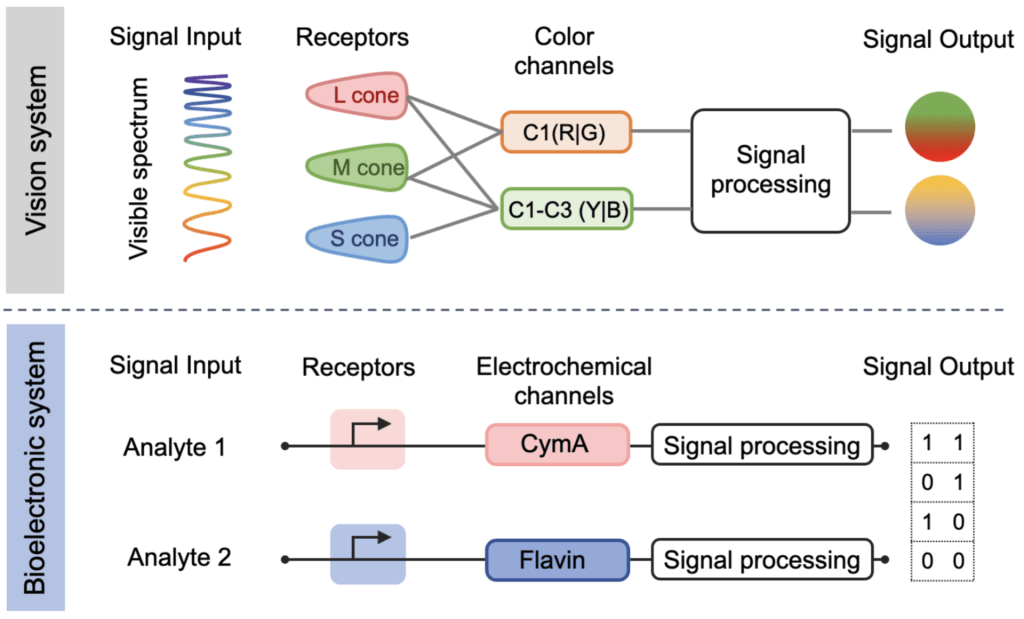Congratulations to Siliang, Carol, and Joe for their recent publication in Biosensors and Bioelectronics! They developed a whole-cell bioelectronic sensor that can sense 1,4-dihydroxy-2-naphthoic acid within seconds and is capable of continuous monitoring. In a simulated gut environment, the sensor was selective for relevant quinones and they present a predictive multivariate model to describe the mechanism. This platform has significant application for environmental monitoring and human health. Read the paper here.
Dr. Ajo-Franklin named a collaborator on the Laboratory-University Collaboration Initiative
Caroline will collaborate with the Naval Research Laboratory’s Tanya Tschirhart on the project “Connecting Electron Flow and Gene Expression in Cells for Multi-Channel Electrogenetics.” Dr. Tschirhart is a fellow in the Department of Defense’s 2023 class of the Laboratory-University Collaboration Initiative. Read more here.
Dr. Ajo-Franklin featured in Phys.org article!
The American Society for Microbiology published an article entitled “Bacterial biosensors: The future of analyte detection” in which Caroline discussed the development of whole-cell biosensors for environmental and human health. Read it here!
New Preprint Alert! Multichannel bioelectronic sensing using engineered Escherichia coli
Congrats to Dr. Xu Zhang for her new manuscript on bioRxiv! Xu successfully integrated two separate extracellular electron transfer pathways controlled by different sensing modules into E. coli. Along with an agnostic algorithm she developed, this platform is capable of simultaneously sensing different heavy metals in urban water samples and transmitting a 2-bit binary readout. This is an important step forward in the informational capacity of bioelectronic sensors. Read more here!

Carol passed her A exam!
Congratulations to Carol De Groote Tavares for passing her Admission to Candidacy exam! Carol studies electrogenetics in Lactiplantibacillus plantarum and is a real credit to the program. Read about our group’s work on extracellular electron transfer in L. plantarum here.
Congratulations Alanna!
We’re happy to announce that Alanna Stull has passed her Masters thesis defense! Her research focused on controlling the structure and properties of engineered living materials. She modulated cell surface display through environmental factors and brought great insight into our materials. We’re excited to see what the next phase of her career brings!
Congratulations, Sara!
We’re excited to share that Dr. Sara Molinari will joining the Fishell Department of Bioengineering at the University of Maryland as an incoming professor this summer! Her lab will bridge synthetic biology and material science to develop multifunctional engineered living materials for health and environmental applications. Keep an eye out as she builds her new group!
Welcome Chloe and Robyn!
Ha Chau (Chloe) Nguyen and Robyn Alba have joined our group for their Ph.D. research. Chloe is in the Rice U.’s Systems, Synthetic, & Physical Biology Program and will be exploring the fundamental mechanisms of biomaterial formation. Robyn is in the Biochemistry & Cell Biology Program and will be creating living biosensors with bioelectronics. We’re so pleased to have them on the team!
Congratulations Joe!
Dr. Joe Tolar has successfully defended his PhD! His dissertation presentation covered “Expanding the Understanding of Extracellular Electron Transfer Mechanisms and the Physiological Impacts in Gram-Positive Bacteria” and you can read about his work here. He will be joining LevitasBio next.


Welcome Olivia!
Olivia Suggs has joined our group to work on allosteric protein switches as part of our Bioelectronics research. Olivia has a Bachelors in Biochemistry from Spelman College and is in the Biochemistry and Cell Biology Ph.D. program at Rice. We’re excited to have her on board!
